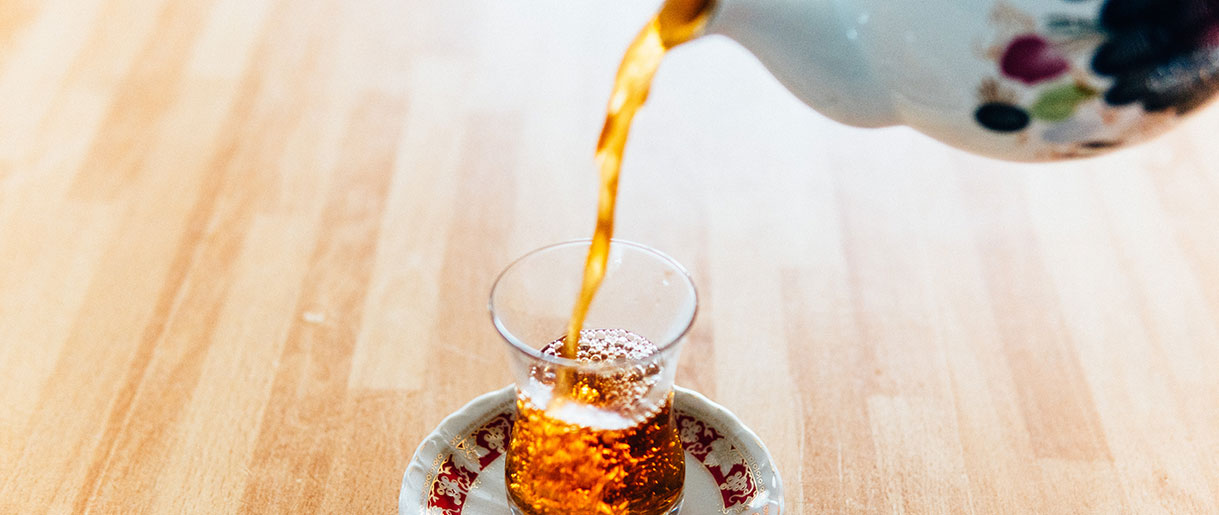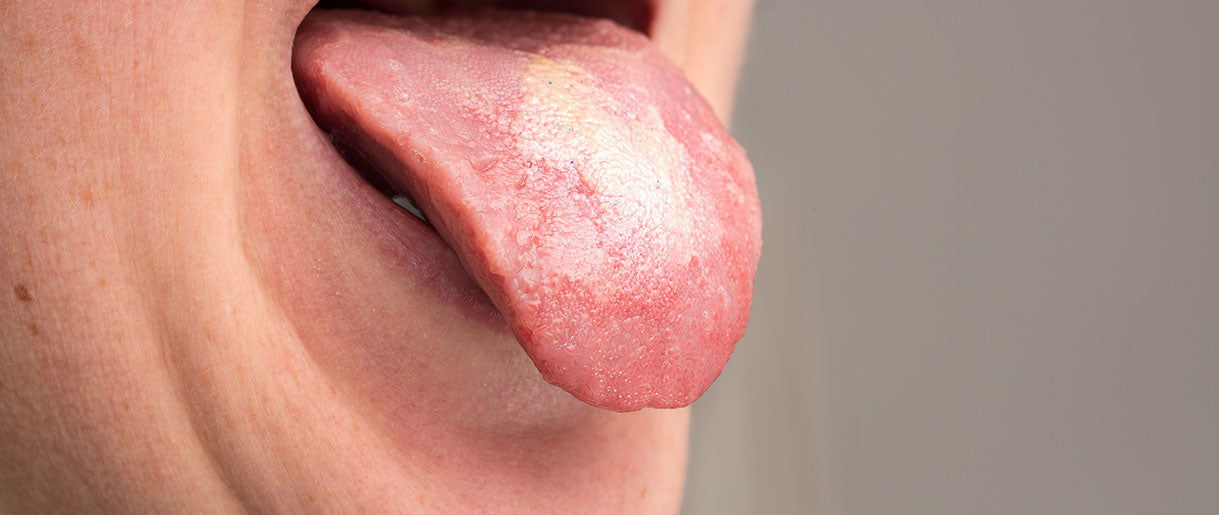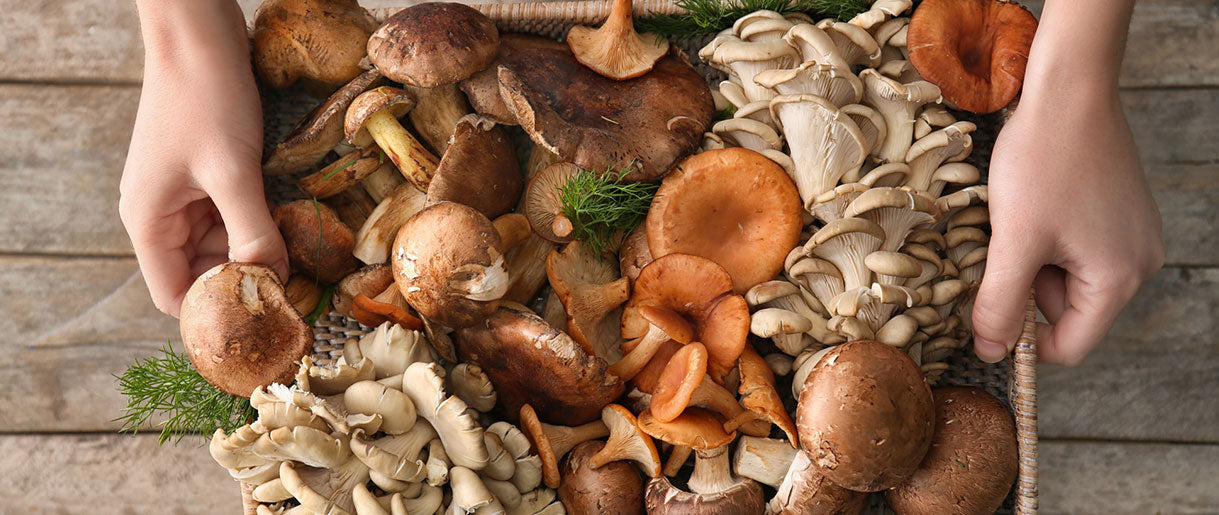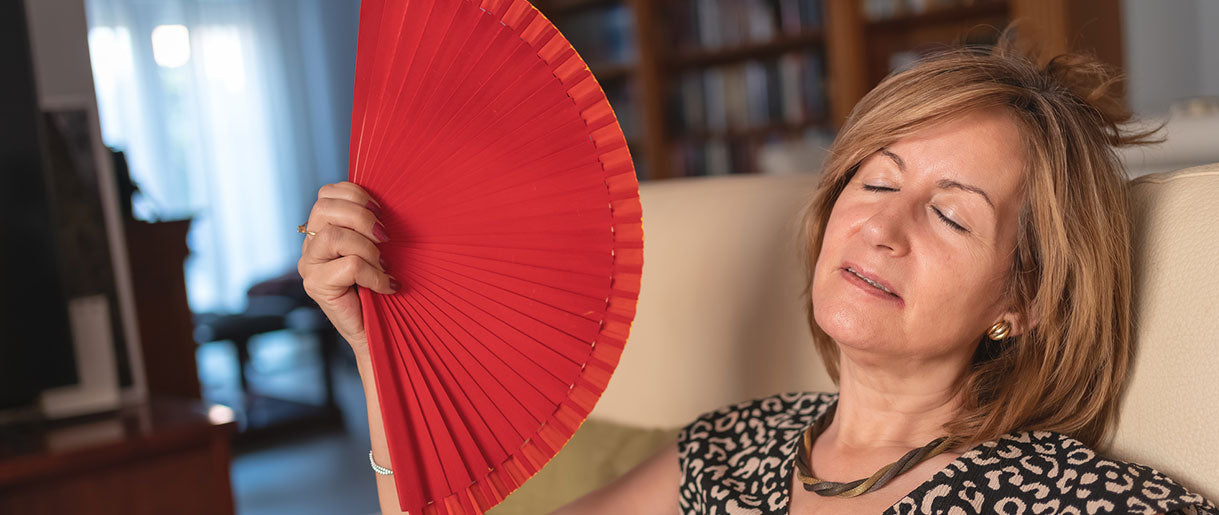Ah, picture it: a perfect day, the sun is a warm, gentle kiss on the skin and the sweet, flirtatious spring breeze dances through the air. You're there, soaking it all in, when suddenly... Achoo! The sneaky sniffles crash your party, your nose mimicking the Great Flood, eyes itching as if they're plotting an escape. Familiar, isn't it? And, oh, the drama of it all!
In this whimsical world of wellness, imagine your allergy arsenal brewing in your teapot: the celebrity antioxidant known as Green Tea, Peppermint Tea taking a minty breath of relief, Chamomile Tea soothing your evenings, and Ginger Tea standing guard as a spicy sentinel.
Picture the Red Defender, Rooibos Tea, alongside the Herbal Underdog, Nettle Tea, with Butterbur Tea acting as the seasonal guardian.
Then, the sweet punch of Licorice Tea and the respiratory healer, Eucalyptus Tea, team up with the golden protector, Turmeric Tea. And let's not forget our mighty fungal warrior, Chaga Mushroom, brewing into a potion of resilience.
Now, amidst this tantalizing troupe of teas, you're not just reaching for temporary relief but invoking a holistic guardian. One that aligns with your body, offering not a hushed whisper but a roaring rally against symptoms, wrapping you in a cloak of wellness.
Intrigued? Let's journey through ancient fields and modern science, uncovering how your humble brew can be the hero you've been waiting for.
It's time to turn those sips into safeguards. So, put the kettle on; we've got some brewing secrets to spill!
Unveiling the Enemy – Allergies!

Why Does Your Body Betray You?
Oh, the human body, a marvel of nature, a complex machine designed to protect and survive, and yet, sometimes it feels like it didn't quite get the memo.
Why else would it hit the panic button when pollen graces the air or a dust bunny hops by? Seasonal allergies, my friends, are like that overzealous friend at a party—they mean well, but boy, can they cause chaos in the lounge!
The Overprotective Warrior Within
Now, picture this: a warrior—your immune system—poised, ready to defend its castle. But wait... is that an intruder?
No, it's just a speck of dust, but your body goes full medieval, raising the drawbridge, pouring the hot oil, and unleashing the archers. Though slightly dramatic, this hyper-vigilance is behind those pesky allergy symptoms.
Understanding the Allergic Overreaction

Here's the scoop: allergic reactions are your body's over-the-top way of fending off what it mistakenly thinks are harmful invaders.
Whether it's hay fever symptoms making your spring a sniffly saga or allergic rhinitis transforming your stuffy or runny nose into its main storyline, it's all because your body is trying a little too hard to save you from... well, mostly harmless stuff.
Silver Linings: Symptoms Signal Superhero Mode
But here's a silver lining: these uncomfortable symptoms are just signs that your body's defense mechanism is in superhero mode.
Sure, it may confuse daisies with dragons (cue sore throats, watery eyes, and the works), but it means you've got a guardian in there. Albeit, one that could use some chill pills.
Nature's Apology: Allergy Relief in a Teacup

Now, wouldn't it be grand to dial down this drama? To enjoy the blooms without the doom and gloom? To not have to worry about allergy season turning you into a hermit? That's where nature comes back to apologize for the pollen with a bouquet of allergy relief.
Believe it or not, nestled in nature's bosom are remedies, little sips of serenity that promise more than just treating allergic rhinitis. They come whispering secrets of antihistamine properties, offering a gentle pat on your system's back, saying, "Relax, buddy. It's just a petal."
Yes, we're talking about harnessing a natural antihistamine to reduce allergy symptoms, soothing that allergic response and calming the storm in your nasal passages.
Next Up: Teas Take the Battlefield
Stay tuned, as we delve into the kettle and summon the steamy knights ready to become your allies against common symptoms. It's time for caffeinated and caffeine-free teas to take the stage in the battle of the blooms!
Meet Your Allergy-Fighting Heroes
1. Green Tea: The Celebrity Antioxidant🍵

You've heard the buzz around green tea, right? But did you know it's also a front-runner among teas for allergies?
Packed with potent tea polyphenols, this leaf is not just about keeping you zen but also armoring you against those sneaky allergy symptoms.
Picture this: you're sipping your way to relief, thanks to the wonders of benifuuki green tea (1). It's no ordinary brew; studies suggest a cuppa could ease your nasal symptoms. Now, who wouldn't want that?
2. Peppermint Tea: The Minty Breath of Relief 🍃

Enter peppermint tea, a blast of freshness and one of the most refreshing herbal teas for allergies.
It's like a breath of fresh, cool air for your insides, especially when sinusitis symptoms(2) are getting you down. This benefit makes it one of the best teas for colds.
And it's not just about the minty magic; this herbal marvel is known for its ability to soothe respiratory symptoms (3), making it a go-to for holistic healers. A whiff, a sip, and ah, relief!
3. Chamomile Tea: Your Evening Soother🌼

Imagine the sun is setting, and you're winding down with a cup of chamomile, one of the most gentle teas good for allergies.
Known for its soothing properties and ability to kiss goodnight to those irritating itchy eyes, it's every allergy sufferer's dream.
And guess what? It's not just folk wisdom; science backs(4) its anti-inflammatory superpowers, too. Relaxing, right?
4. Ginger Tea: The Spicy Sentinel🌶️

Ginger tea isn't just a zesty affair; it's a guardian against allergens(5). With each sip, you're ingesting a force field of anti-inflammatory properties(6). How, you ask?
The ginger root itself is a trove of remedies, known to reduce inflammation in the nasal mucosa. It's like having a personal bodyguard warding off allergic trespassers. You're not just drinking a spice; you're recruiting a fierce ally in your battle against sniffles.
5. Rooibos Tea: The Red Defender🍂

Ever heard of Rooibos tea? Originating from the vibrant slopes of South Africa, this non-caffeinated delight is among the best teas for allergies (7).
But that's not all! Rooibos is a treasure chest of health benefits, including quercetin, a natural antihistamine that's got your back during allergy season.
Imagine combating those troublesome sneezes and watery eyes with every comforting sip. It's like wrapping yourself in a protective red cape!
6. Nettle Tea: The Herbal Underdog🌿

Now, meet Nettle tea, the unsung hero in the world of herbal teas. Not just an ordinary plant but a beacon of hope for those plagued with allergies.
Stinging nettle tea, often overlooked, is packed with goodies like vitamin C and potent anti-inflammatory compounds(8). Picture easing your respiratory ailments with this herbal brew, proven by human clinical studies (9). It's nature's own remedy, providing a shield against daily discomforts.
7. Butterbur Tea: The Seasonal Guardian🌱

Here comes Butterbur, a warrior when seasonal allergies try to steal your joy. This perennial shrub does wonders, and guess what? It's been the subject of various scientific studies (10), showing promise in battling those pesky hay fever symptoms.
With its anti-inflammatory powers, Butterbur stands guard, protecting you when trees and flowers are in bloom. Imagine enjoying nature without the sniffles, all thanks to a guardian in your teacup!
8. Licorice Tea: Sweetness with a Punch🍬

Licorice tea, sweet yet potent, is your loyal ally. Made from the licorice plant's roots, this tea isn't just about satisfying your sweet tooth.
It's a powerhouse, especially if you've been battling chronic respiratory issues(11). With glycyrrhizin, known for fighting inflammation, Licorice tea goes beyond a mere treat.
It's a sweet elixir for your throat, aiding your body's defenses. Indulge in a cup of kindness for your health!
9. Eucalyptus Tea: The Respiratory Healer🌿

Eucalyptus isn't just for koalas! Eucalyptus tea is like a breath of fresh air for your system, especially renowned for clearing stuffiness and combating throat irritation(12).
Its cineole compound is a jewel for relief from sinusitis symptoms and respiratory health(13). Picture a therapeutic aroma clearing your pathways, an invigorating sensation with each sip. It's not just tea; it's a rejuvenation ritual.
Well, and you can imagine, it is not caffeinated and helps you relax—the perfect candidate in the category of teas for sleep.
10. Turmeric Tea: The Golden Protector🟡

The crown jewel, Turmeric tea, glistens with its golden color, offering more than just aesthetic pleasure. It's a centuries-old remedy, adopted by modern wellness gurus for itscurcumin content.
This compound is a blessing for those seeking to fight inflammation(14)and boost immunity. Imagine each sip coating you in golden armor, shielding you from allergic reactions. This is not just a drink; it's liquid gold for your well-being!
11. Chaga Mushroom: The Mighty Fungal Warrior🍄

Venture beyond the leaf, and you'll find the beneficial Chaga Mushroom—not in a fantasy tale but in the realm of extraordinary health support.
The Chaga mushroom brewed into a tea defies expectations with beta-glucans, a magical element for your immune system(15).
You're not just sipping a concoction; you're imbibing a legendary elixir known in traditional Chinese medicine, proven to support your body's defenses (16). Who knew wellness could be this enchanting?
Brewing A Pot of Magic: The Perfect Ritual

Alright, team, gather around! Brewing the perfect cup of herbal tea is not just science; it's an art form. Knowing how to unlock each ingredient's full magic is the game-changer for those who swear by herbal teas for allergies. We're talking about a ritual that transforms dried herbs into a potion of wellness. Let's dive in!
Choosing Your Weapon (Tea!) Wisely
First thing first, select your tea. This isn't a random choice; it's a strategic decision. Are we fighting a sore throat, a stuffy nose, or itchy eyes?
The best teas for allergies are those that target your specific symptoms. From stinging nettle tea for its daring boldness against sniffles to the sweet, soothing embrace of licorice root tea, your choice is your secret weapon.
You can also consider Reishi mushroom tea, a fungi tea with immune-boosting properties that brings a whole world of wellness into your kitchen.
The Sacred Art of Water Temperature
Hot water? Yes! Boiling water? No! Here's a little secret: boiling water can bully your delicate herbs. It's about respect.
Around 208°F (just before boiling) is perfect. This way, you coax out the active ingredient from each tea leaf or slice of root, preserving their medicinal qualities and antioxidant properties.
Steeping: Patience Brews Perfection
Time is of the essence, but haste? That's an unwelcome guest. Steeping requires patience. Let those leaves unfurl and dance, usually between 4 and 6 minutes.
Magic happens during this sacred window. Each second unlocks a new spectrum of health benefits, infusing your cup of herbal or mushroom tea with nature's best defense against nasal inflammation and allergies.
No Lone Rangers: Embrace Complementary Therapies

Now, while these teas are potent, they love company. Integrating other complementary therapies amplifies their power.
A dash of local honey, a slice of fresh ginger, or even a sprinkle of turmeric can boost those anti-inflammatory benefits. It's like forming a league of extraordinary elements, all working in unison to bring you relief.
Consistency is Key
Here's the deal: one cup of tea is a comfort, but a consistent ritual involving tea for allergies? That's a solution.
Especially during the early spring or early fall, known battlefields of allergies and sinus troubles. Regularly brewing a pot ensures your body receives natural antihistamines and powerful anti-inflammatory goodness.
Enjoy the Experience
Finally, none of this has to be a solemn task. Make it fun!
Enjoy the aroma and taste of Chaga mushroom tea (or any other tea you choose) and the warmth in your hands when drinking tea.
Let this "tea time" be a moment of mindfulness in your day, connecting you with nature's wonders. You can make it part of your morning routine for energy.
A Cup in the Life: Integrating Teas into Your Daily Dance

Welcome to a life more...brew-tiful! Integrating herbal tea into your daily routine isn't about altering your lifestyle.
No, it's about enhancing it, adding rhythm to your daily dance with the healing grace of nature's brews. It's creating moments for yourself, building an invisible shield against those pesky allergies, one cup at a time. Here's how you choreograph this dance:
Morning: The Symphony Begins with Green Tea
Let the first thing you reach for be a warm, comforting mug of green tea. Packed with antioxidants and blessings from the realm of traditional remedies, it's your dawn patrol against inflammation. This isn't just about drinking tea; it's setting the tone for a day where your wellness takes center stage.
Mid-Morning: Peppermint's Refreshing Pause
Before the day ramps up, hit the pause button with peppermint tea. Its minty notes are like a second breath, clearing sinusitis symptoms and bringing a cool, calming influence to any escalating allergic reactions. It's not a break from the day; it's the zest that keeps you at your peak.
Afternoon: Rooibos, Your Sunset Calm
As the day's hustle starts to wind down, let rooibos be your serene transition. Not just a cup of warmth, but a beacon of calm, rich with anti-inflammatory properties and an ally against hyper-reactive immune responses. It's more than a tea break; it's your body's diplomatic answer to the stresses that often kindle allergies.
Evening: Chamomile, the Nighttime Lullaby
And as the stars wink open in the night sky, end your day with chamomile tea's gentle, soothing embrace. This isn't just your wind-down potion; it's your very own lullaby in a cup, preparing your immune system for a night of restorative sleep and healing. It whispers promises of a refreshed tomorrow.
FAQs About Teas for Allergies
Can Drinking Tea Help With Severe Allergies, Or Is It Just A Mild Relief?
While tea can provide a comforting relief from mild allergy symptoms due to its natural antihistamines and anti-inflammatory properties, it's not a substitute for professional medical advice or treatment.
People with severe allergies experience intense reactions that could be part of a larger immune response issue. In these cases, it's always recommended to consult a healthcare professional who can advise on a comprehensive treatment plan.
Are There Any Side Effects Of Consuming These Teas Daily?
Most herbal teas are safe for daily consumption but can interact with certain medications or underlying health conditions. For instance, licorice root tea may elevate blood pressure and isn't recommended for individuals with hypertension.
Pregnant women should exercise caution with herbal teas, as some herbs can affect hormone levels or stimulate uterine contractions (e.g., nettle or peppermint). It's crucial to consult a healthcare provider before adding new herbal teas to your regimen, ensuring they don't interfere with your health conditions or medications.
How Long Does It Take To See Improvements In Allergy Symptoms?
The time it takes to notice improvements in allergy symptoms after starting to drink herbal teas can vary widely from person to person. Some individuals may feel relief within a few hours of drinking tea, especially in cases of mild allergic reactions, while for others, it might take a few weeks of consistent consumption to notice significant changes.
This is because herbal teas work subtly and gradually, balancing the body's natural responses over time rather than providing immediate, drastic relief like some medications. It's important to maintain a consistent routine, listen to your body, and consider keeping a symptom diary to track any changes.
Key Takeaways
As the sun peeks through your window, your day begins not with sneezes but with the empowering aroma of a golden brew. Each sip isn't just a delightful dance on your taste buds but a bold stride in your allergy showdown.
You've journeyed through the valleys of green tea's antioxidants and scaled the spicy cliffs of ginger's fortitude, collecting your herbal allies like precious gems. And as night falls, the 'mighty mushroom' stands as your night watch, guarding against the sneaky pollen and persistent dust that dared to challenge your fortress.
Now, armed with nature's bounty and a splash of newfound wisdom, the battlefield seems less daunting, doesn't it?
But remember, warriors are not born in solitude. So, we call upon the legions of tea enthusiasts, the homebrewed concoction wizards, and keepers of grandma's clandestine tea recipes—share your tales, blends, and spirited comments below.
References
- In vitro and in vivo anti-allergic effects of ‘benifuuki’ green tea containing O-methylated catechin and ginger extract enhancement, (1), https://www.ncbi.nlm.nih.gov/pmc/articles/PMC2104550/
- Effects of peppermint (Mentha piperita L.) extracts on experimental allergic rhinitis in rats, (2), https://pubmed.ncbi.nlm.nih.gov/11201253/
- A review of the bioactivity and potential health benefits of peppermint tea (Mentha piperita L.), (3), https://pubmed.ncbi.nlm.nih.gov/16767798/
- Chamomile: A herbal medicine of the past with bright future, (4), https://www.ncbi.nlm.nih.gov/pmc/articles/PMC2995283/
- Prevention of allergic rhinitis by ginger and the molecular basis of immunosuppression by 6-gingerol through T cell inactivation, (5), https://pubmed.ncbi.nlm.nih.gov/26403321/
- Anti-Oxidative and Anti-Inflammatory Effects of Ginger in Health and Physical Activity: Review of Current Evidence, (6), https://www.ncbi.nlm.nih.gov/pmc/articles/PMC3665023/
- Rooibos herbal tea reduces allergic basophil activation in adult atopic patients, (7), https://pubmed.ncbi.nlm.nih.gov/31672527/
- Lipophilic stinging nettle extracts possess potent anti-inflammatory activity, are not cytotoxic and may be superior to traditional tinctures for treating inflammatory disorders, (8), https://www.ncbi.nlm.nih.gov/pmc/articles/PMC3529973/
- Stinging Nettle (Urtica dioica L.): Nutritional Composition, Bioactive Compounds, and Food Functional Properties, (9), https://www.ncbi.nlm.nih.gov/pmc/articles/PMC9413031/
- LiverTox: Clinical and Research Information on Drug-Induced Liver Injury [Internet], (10), https://www.ncbi.nlm.nih.gov/books/NBK547997/
- Glycyrrhiza glabra (Licorice): A Comprehensive Review on Its Phytochemistry, Biological Activities, Clinical Evidence and Toxicology, (11), https://www.ncbi.nlm.nih.gov/pmc/articles/PMC8703329/
- Effects of using eucalyptus (Eucalyptus globulus L.) leaf powder and its essential oil on growth performance and immune response of broiler chickens, (12), https://www.ncbi.nlm.nih.gov/pmc/articles/PMC5454581/
- Antiviral Activities of Eucalyptus Essential Oils: Their Effectiveness as Therapeutic Targets against Human Viruses, (13), https://www.ncbi.nlm.nih.gov/pmc/articles/PMC8706319/
- Synergistic Anti-Inflammatory Activity of Ginger and Turmeric Extracts in Inhibiting Lipopolysaccharide and Interferon-γ-Induced Proinflammatory Mediators, (14), https://www.ncbi.nlm.nih.gov/pmc/articles/PMC9229778/
- Immunomodulatory Activity of the Water Extract from Medicinal Mushroom Inonotus obliquus, (15), https://www.ncbi.nlm.nih.gov/pmc/articles/PMC3774877/
- Recent Developments in Inonotus obliquus (Chaga mushroom) Polysaccharides: Isolation, Structural Characteristics, Biological Activities and Application, (16), https://www.ncbi.nlm.nih.gov/pmc/articles/PMC8124789/










Let Us Know Your Comments